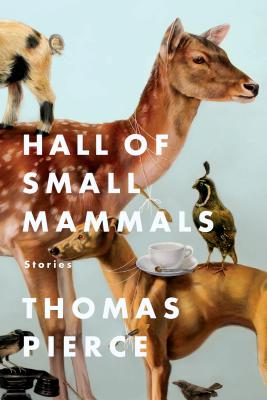A wild, inventive ride of a short story collection from a distinctive new American storyteller.
The stories in Thomas Pierce’s Hall of Small Mammals take place at the confluence of the commonplace and the cosmic, the intimate and the infinite. A fossil-hunter, a comedian, a hot- air balloon pilot, parents and children, believers and nonbelievers, the people in these stories are struggling to understand the absurdity and the magnitude of what it means to exist in a family, to exist in the world.
In “Shirley Temple Three,” a mother must shoulder her son’s burden—a cloned and resurrected wooly mammoth who wreaks havoc on her house, sanity, and faith. In “The Real Alan Gass,” a physicist in search of a mysterious particle called the “daisy” spends her days with her boyfriend, Walker, and her nights with the husband who only exists in the world of her dreams, Alan Gass. Like the daisy particle itself—“forever locked in a curious state of existence and nonexistence, sliding back and forth between the two”—the stories in Thomas Pierce’s Hall of Small Mammals are exquisite, mysterious, and inextricably connected.
From this enchanting primordial soup, Pierce’s voice emerges—a distinct and charming testament of the New South, melding contemporary concerns with their prehistoric roots to create a hilarious, deeply moving symphony of stories.
Read one of the stories HERE.
And here is a letter for the readers from the author:
Dear Reader,
I’d like to tell you a little bit about my first book, Hall of Small Mammals. This is a book of stories about people trying to make sense of an unusual situation—that situation being life itself. They are about people looking for meaning—in religion, in science, in family, in geology and paleontology, in trips a thousand feet off the ground in a hot air balloon. I’ve been told that I write stories that are odd, strange, or weird, and I won’t quibble too much with those descriptions except to say how odd, strange, and weird life can be (when you forget to pretend you understand it).
For instance: Years ago, my grandmother was walking on the beach and found a massive almost-black shark’s tooth in the sand and gave it to me. It was possibly the best gift I’d ever received. (I was nine.) It might have come from a terrifying prehistoric shark called the Megalodon. The biggest shark that ever lived, some of them longer than an eighteen-wheeler, and now I had its tooth in my sock drawer. What a world! One day it could be our teeth in a sock drawer. (In case fossils appeal to you, there are quite a few in this book.)
In the collection’s first story, a newly retired woman ends up caring for a resurrected woolly mammoth named Shirley Temple. Sure, yes, that’s odd. But consider this: Pretty soon, tomorrow morning maybe, a team of scientists will stand in front of some news cameras and announce that they’ve successfully brought some pitiful creature back from extinction, a passenger pigeon or a dodo bird or a woolly mammoth. We haven’t seen a living mammoth for thousands of years, but we’re still finding their carcasses in the ice. Not just bones—but skin, hair, and organs too. Some Russian researchers found an especially juicy mammoth corpse last year in Siberia. They named her Buttercup. When they sliced her open, she oozed blood! A biotech company in South Korea hopes Buttercup will be the key to the world’s first cloned mammoth. Buttercup returneth.
Down in my home state, a little girl who enjoys looking for shark’s teeth on her school playground during recess wrote her state senator earlier this year asking why it was South Carolina didn’t have an official fossil. We have an official beverage (milk) and snack (boiled peanuts) and dance (shag) but somehow we’d neglected to name a fossil, like most other states. She nominated the Columbian woolly mammoth as an ideal candidate, as its teeth had been discovered in a Carolina swamp almost three hundred years ago. Some lawmakers got behind the idea, but the bill almost died in the senate when a few Bible-thumping members thought it ought to explicitly acknowledge the creator of those fossils too. Drawing from the Book of Genesis, they wanted to amend the bill thusly: “The Columbian Mammoth, which was created on the Sixth Day with the other beasts of the field, is designated as the official State Fossil.” Just before the senate voted, the majority leader suggested they name the mammoth Lazarus. “Because,” he said, “we’re bringing it back to life.” Weirdness, it abounds.
I do hope you enjoy this book—that its stories move you, that they allow you, if even for a moment, to forget to pretend you understand what it means to be alive in such a strange place as this.
All best,
Thomas


No comments:
Post a Comment